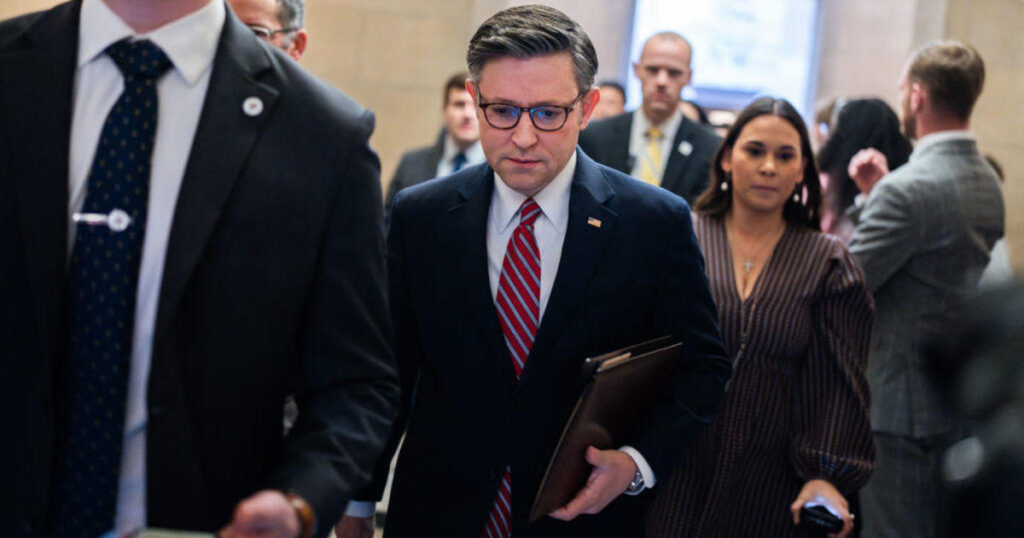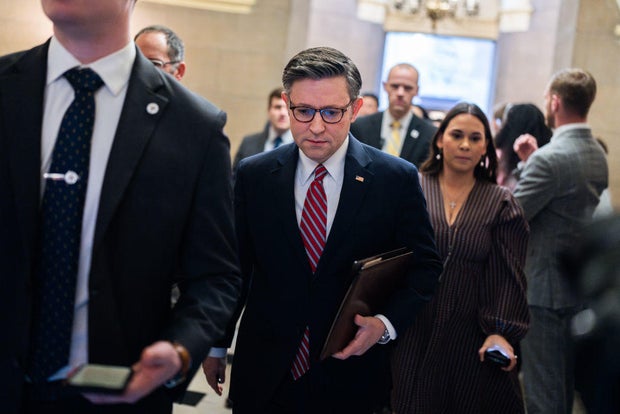Washington — Senators are growing pessimistic about passing a massive spending package that fully funds the government through September by a midnight deadline to avoid a partial shutdown.
The House approved the $1.2 trillion package. announced The bill was voted 286-134 in the early hours of Thursday and just before noon Friday, sending it to the Senate with just a few hours to spare.
The package combines six spending bills into one and will fund about three-quarters of the government through the end of the fiscal year. The bill also includes funding for the Departments of State, Homeland Security, Defense, Labor, and Health and Human Services, as well as for Foreign Affairs, Financial Services, and the Legislature.Another package to fund the rest of the government. passed by parliament 2 weeks ago.
Like previous funding bills, the bill stalled in the Senate after some Republicans demanded a vote on amendments in exchange for speeding up the process. Senate rules that allow one lawmaker to object to speeding up the passage of the bill could push the vote into the weekend.
“There's not much progress,” Republican Sen. Susan Collins of Maine said six hours before the deadline.
Sen. Sheldon Whitehouse criticized the Republican Party's slowdown, saying, “We appear to be heading toward a government shutdown.”
The Rhode Island Democrat noted that if the amendment passes, which is unlikely, the amendment would be sent back to the House for approval. Members of Congress have already left Washington for a two-week recess.
Sen. John Kennedy, R-Louisiana, said Friday night that “with Sunday's vote, it looks like we're headed for a short shutdown.”
If the Senate can send the bill to the president's desk by Monday, the lack of funding won't have a noticeable impact on government operations.
When President Biden signed the first funding package Hours after a similar closure deadline was set earlier this month, the Office of Management and Budget said government agencies would not shut down and could continue normal operations because it was clear a resolution was imminent. .
Passage of the bill will allow Congress to shift its focus to other priorities, including next year's spending bill, which must be signed by October, and foreign aid to U.S. allies, which has been stalled for months.
But House Speaker Mike Johnson (R-Louisiana)'s agreement with Senate Democratic leadership to fund the government, with a majority of the chamber voting against the bill, also undermined his position as leader. became a threat.
The frenzied rush to fund the government is the latest example of internal divisions that have left the Republican majority in the House increasingly narrow, forcing party leadership to rely on Democratic votes to pass legislation, and conservatives was greatly disappointed. House Democrats voted on the bill Friday by a margin of 185 to 22, while Republicans were split 101-112.
Georgia Republican Rep. Marjorie Taylor Greene teased the possibility of a vote of no confidence in Johnson. file an eviction complaint The House of Representatives may be forced to consider it after recessing for the next two weeks. The motion is the same ploy used by a handful of Republicans in October to oust California Rep. Kevin McCarthy from the speakership amid divided party opinion over how to handle spending. .
“I filed a motion to stand down today, but it's more of a warning,” Greene said after the House vote, adding, “It's time for our conference to choose a new speaker.”
spending agreement
Tom Williams/CQ-Roll Call, Inc (via Getty Images)
Unable to pass more than a dozen annual spending bills to fund the federal government, lawmakers have repeatedly relied on short-term funding extensions since October to keep the government running.
They were finally able to break the impasse this month by splitting the bill into two packages. But a dispute over funding for the Department of Homeland Security delayed the rollout of the second package until early Thursday.
As a result, Prime Minister Johnson waived his voluntary 72-hour rule that gives MPs time to read a bill before a vote in order to get it across the finish line to the House of Lords, hours before the clock struck midnight. gave time to give.
Both Republicans and Democrats have won with this policy.
Democrats touted funding for child care and education programs, medical research, mental health care and an extension of the president's Emergency Plan for AIDS Relief, known as PEPFAR, which is credited with saving 25 million lives worldwide.
Republicans emphasized funding for the Border Patrol and adding detention beds. Prohibition of funding Until March 2025, to the United Nations Relief and Works Agency for Palestine Refugees, the main humanitarian agency working in Gaza.
The bill also includes several conservative policy wins. The bill blocks the federal government's ban on gas stoves, limits the flags that can be flown on U.S. diplomatic facilities, and retains provisions barring federal funds from covering abortion services.
In the face of criticism from conservatives who see the bill as a failure, Prime Minister Johnson said it “represents the best outcome achievable in a divided government.”
Republican Representative Andy Ogles of Tennessee said passing the bill would put the Republican majority at risk.
“Some may say Republicans have a majority in the House, but it's clear that Democrats are in control of the speaker's gavel,” Ogles said, adding that passage of the bill would mean “who controls the House.” “This bill will have the biggest impact.” Be sure to decide who the next speaker will be. ”
—Alan He and Ellis Kim contributed reporting.



